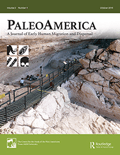
PaleoAmerica
Scope & Guideline
Illuminating the Path of Human Evolution in the Americas
Introduction
Aims and Scopes
- Paleoindian Archaeology:
Exploration of the life ways, technologies, and cultural practices of Paleoindian populations through archaeological findings, including tools, habitation sites, and subsistence strategies. - Geoarchaeology and Chronology:
Utilization of geoarchaeological methods to establish the chronologies of human occupation and environmental changes, enhancing the understanding of how these factors influenced early human settlement. - Technological Organization:
Analysis of lithic technology and resource procurement strategies employed by early populations, including the study of tool types and their functional implications on subsistence patterns. - Cultural Interactions and Adaptations:
Investigation into the interactions between different cultural groups, adaptations to changing environments, and the technological innovations that arose in response to these dynamics. - Regional Studies of Early Human Occupation:
Focused studies on specific geographical areas to uncover local narratives of human presence, migration patterns, and regional adaptations, contributing to a broader understanding of prehistoric human behavior.
Trending and Emerging
- Interdisciplinary Approaches:
There is a notable trend toward combining archaeology with other scientific disciplines, such as genetics and environmental science, to create a more comprehensive understanding of early human populations and their adaptations. - Refinement of Chronological Frameworks:
Recent advancements in dating techniques and geoarchaeological methods have led to a surge in studies aimed at refining the chronological frameworks of human occupations, providing clearer timelines for migration and settlement. - Focus on Technological Diversity:
An increasing emphasis on the diversity of lithic technologies and their implications for understanding cultural adaptations has emerged, highlighting the complexity of early human tool use and resource management. - Reassessment of Established Sites:
A growing trend in revisiting and reevaluating previously studied sites has surfaced, leading to new insights and interpretations regarding human occupation and behavior during the Pleistocene and Holocene epochs. - Cultural Landscape Studies:
Research is increasingly focusing on the interactions between early humans and their environments, exploring how cultural practices shaped and were shaped by the landscapes they inhabited.
Declining or Waning
- Pre-Clovis Claims:
Research surrounding pre-Clovis human occupation evidence has seen a reduction, likely due to increasing skepticism and the need for more robust data to support claims of human presence prior to the Clovis period. - Generalized Theories of Migration:
Broad and generalized theories regarding the peopling of the Americas are less prominent, as the field moves toward more nuanced models that consider regional variations and specific archaeological evidence. - Single-Site Studies:
There is a noticeable decrease in studies focused solely on individual archaeological sites without broader contextual analysis, as researchers increasingly seek to integrate findings within wider regional frameworks.
Similar Journals
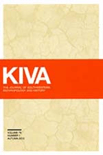
Kiva-Journal of Southwestern Anthropology and History
Advancing Knowledge in Anthropology and HistoryKiva - Journal of Southwestern Anthropology and History is a distinguished academic journal published by Routledge Journals, Taylor & Francis Ltd, that serves as a vital resource for scholars in the fields of anthropology, archaeology, and history. With an ISSN of 0023-1940 and an E-ISSN of 2051-6177, this journal has established itself as a significant avenue for scholarly communication since its inception in 1964. It consistently ranks in the top quartiles, including Q1 in Archaeology and Q2 in Anthropology, reflecting its high impact and rigorous peer-review process. Covering a wide array of topics pertinent to the Southwestern United States, Kiva invites original research articles, reviews, and methodological papers that advance understanding of the region's rich cultural heritage and historical narratives. While currently not open access, its commitment to disseminating quality research makes it an essential reading for researchers, professionals, and students aiming to explore the multifaceted dimensions of southwestern studies.
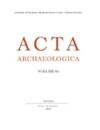
ACTA ARCHAEOLOGICA
Fostering Dialogue in Archaeological ScholarshipACTA ARCHAEOLOGICA is a highly regarded, peer-reviewed journal published by BRILL, focusing on the dynamic field of archaeology. With an ISSN of 0065-101X and an E-ISSN of 1600-0390, this journal disseminates innovative research, critical analyses, and comprehensive reviews that contribute to our understanding of human history, cultural heritage, and archaeological methodology. ACTA ARCHAEOLOGICA has excelled in its field, achieving a Q1 ranking in both the Arts and Humanities and Social Sciences categories for 2023, showcasing its impact and relevance in scholarly discourse. Though not currently open access, the journal caters to a diverse audience of researchers, professionals, and students, offering invaluable insights into archaeological studies from a global perspective. As it continues to foster academic dialogue, ACTA ARCHAEOLOGICA remains a cornerstone for those looking to deepen their knowledge and engage with cutting-edge archaeological research.
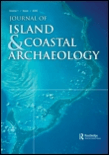
Journal of Island & Coastal Archaeology
Bridging Cultures and Environments in Archaeological ResearchThe Journal of Island & Coastal Archaeology, published by Routledge Journals, Taylor & Francis Ltd, stands as a leading publication in the fields of archaeology, ecology, and history, boasting a prestigious Q1 ranking in multiple categories as of 2023. Since its inception in 2006, this journal has been a vital resource for researchers, professionals, and students interested in the rich archaeological heritage of island and coastal regions. With an impressive Scopus ranking that places it in the top tiers of both Arts and Humanities and Social Sciences, it offers insightful studies and innovative methodologies that address the complexities of human interactions with marine and terrestrial environments. The journal aims to advance knowledge and promote discussion through rigorous peer-reviewed articles, fostering a deeper understanding of indigenous cultures and their environmental contexts. While currently not offering an open-access model, the journal remains committed to disseminating high-quality research crucial for shaping future archaeological scholarship.
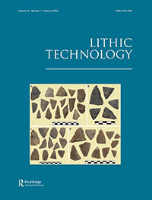
Lithic Technology
Pioneering Research in Stone Tool AnalysisLithic Technology is a premier international journal published by Routledge Journals, Taylor & Francis Ltd, dedicated to advancing the field of lithic studies in archaeology and anthropology. Established in 1977, this prestigious journal has established itself at the forefront of research concerning stone tool technology, providing a vital forum for scholars to share groundbreaking findings and methodologies. With an impressive Q1 ranking in both Archaeology and Anthropology, and indexed within the 91st percentile in its respective categories by Scopus, Lithic Technology is recognized for its significant contributions to the understanding of human prehistory and material culture. The journal features a diverse array of articles, from theoretical approaches to practical case studies, ensuring relevance to contemporary archaeological discourse. Though not an open-access publication, its meticulous peer-review process guarantees the highest quality of scholarship, making it an indispensable resource for researchers, professionals, and students eager to expand their knowledge in the rigors of lithic analysis.

Intersecciones en Antropologia
Stimulating critical discussions in anthropology.Intersecciones en Antropologia, published by the Universidad Nacional del Centro de la Provincia de Buenos Aires (UNICEN), Facultad de Ciencias Sociales, is a premier open-access journal in the field of anthropology, having established its presence since 2010. With an impressive impact factor and currently holding the distinguished Q1 quartile ranking in anthropology for 2023, this journal has quickly become a vital resource for scholars and practitioners alike, offering a platform for innovative research and critical discussion. The journal aims to advance anthropological scholarship by encouraging the dissemination of diverse perspectives and stimulating dialogue across geographical and cultural boundaries. Its open-access model, adopted in 2017, ensures that valuable research findings are accessible to a global audience, fostering collaboration and engagement within the academic community and beyond. Located in the vibrant cultural context of Argentina, Intersecciones en Antropologia serves as a conduit for significant anthropological dialogues, making it an essential read for those dedicated to understanding and contributing to the evolving landscape of social sciences.
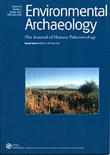
ENVIRONMENTAL ARCHAEOLOGY
Illuminating the Connection Between Human History and the EnvironmentENVIRONMENTAL ARCHAEOLOGY, published by ROUTLEDGE JOURNALS, TAYLOR & FRANCIS LTD, serves as a leading platform for innovative research at the intersection of archaeology and environmental science. With a commendable history dating back to 1981 and a notable convergence in scholarly discussion from 2002 to 2024, this journal holds an esteemed Q1 ranking in both Archeology and Archeology (arts and humanities), as well as a Q2 in Environmental Science as of 2023. Positioned in the United Kingdom, ENVIRONMENTAL ARCHAEOLOGY's ISSN 1461-4103 and E-ISSN 1749-6314 reflect its commitment to disseminating high-quality research that explores how past human interactions with the environment inform modern ecological challenges. With its robust Scopus standings, including a rank of #17/413 in Arts and Humanities and an impressive #15/354 in Social Sciences, the journal is recognized for its significant contribution to the field, making it an essential resource for researchers, professionals, and students eager to advance their understanding and application of environmental archaeology.

Archaeological and Anthropological Sciences
Unveiling the Past, Shaping the FutureArchaeological and Anthropological Sciences is an esteemed peer-reviewed journal published by Springer Heidelberg, specializing in the interdisciplinary fields of archaeology and anthropology. Since its inception in 2009, this journal has established itself as a pivotal resource for researchers and professionals, featuring cutting-edge studies that bridge the gap between the sciences and humanities. With its impressive 2023 Q1 rankings in Anthropology and Archaeology categories, the journal stands out in the Scopus landscape, ranking within the top 5% of its field—Rank #18/413 in Archaeology (Arts and Humanities) and Rank #28/502 in Anthropology. This is complemented by its commitment to disseminating high-quality research to a global audience, despite being a non-Open Access publication. The journal's scope encompasses innovative methodologies, archaeological findings, and anthropological insights that are vital for advancing knowledge and fostering academic discourse. As it moves toward its upcoming converged years, Archaeological and Anthropological Sciences continues to solidify its reputation as a key forum for scholarly exchange in these fields.
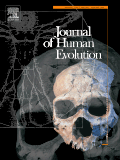
JOURNAL OF HUMAN EVOLUTION
Advancing Knowledge on Human OriginsThe JOURNAL OF HUMAN EVOLUTION, published by ACADEMIC PRESS LTD - ELSEVIER SCIENCE LTD, is a premier academic journal focusing on the evolutionary biology of humans and their ancestors. With an esteemed Q1 ranking in the fields of Anthropology and Ecology, Evolution, Behavior and Systematics, this journal is a vital resource for researchers, professionals, and students dedicated to understanding human origins and evolutionary processes. The journal has been steadfastly contributing to the field since 1972, converging knowledge and insights through meticulously peer-reviewed articles. Additionally, it holds an impressive Scopus rank of #12/502 in Anthropology and #105/721 in Ecology, underlining its significant impact and prestige within the academic community. While the journal is not open access, its content remains accessible to those within institutional affiliations, fostering an environment rich in scholarly exchange and innovation. By disseminating cutting-edge research and comprehensive reviews, the JOURNAL OF HUMAN EVOLUTION continues to illuminate the complex narrative of human evolution and is essential reading for anyone engaged in this dynamic field.
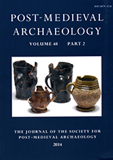
Post-Medieval Archaeology
Innovating Archaeological Methodologies for a Deeper UnderstandingPost-Medieval Archaeology is a distinguished academic journal published by ROUTLEDGE JOURNALS, TAYLOR & FRANCIS LTD, focusing on the rich tapestry of human history from the post-medieval period through the lens of archaeology. With a proud publication history spanning since 1967, this journal addresses the integration of archaeological findings with historical narratives, contributing significantly to the field of archaeology and history. The journal holds an impressive categorization within the Q2 and Q3 quartiles for Archaeology and History in 2023, showcasing its commitment to academic excellence and relevance within these disciplines. Researchers and professionals alike will find value in its critical examinations and innovative methodologies that illuminate the past, making it a pivotal resource for those engaged in archaeological research. As an essential platform for scholarly debate and dissemination, Post-Medieval Archaeology continues to advance the understanding of post-medieval contexts and material culture, fostering discussions that resonate through various areas of the arts, humanities, and social sciences.
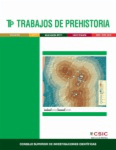
Trabajos de Prehistoria
Unlocking the Secrets of Prehistory Through Open Access ScholarshipTrabajos de Prehistoria is a distinguished peer-reviewed journal published by the Consejo Superior de Investigaciones Científicas (CSIC) since 1988, and it has established itself as a vital resource in the field of archaeology and prehistory. With an impressive impact factor and an open access policy, the journal aims to disseminate high-quality research that contributes to the understanding of human history and prehistorical studies. This Spanish journal has consistently ranked in the top quartile (Q1) in both the Arts and Humanities and Social Sciences categories, reflecting its significance in advancing archaeological scholarship, with Scopus rankings placing it in the 85th percentile among its peers. Covering a broad scope of topics related to archaeology, it serves as a platform for innovative research that connects researchers, professionals, and students globally, enhancing academic dialogue and fostering interdisciplinary collaboration. Based in Madrid, European researchers and global academics alike benefit from its open access model, promoting wider distribution and accessibility of foundational studies in the field.